AST256 Sport in History: Racial Concepts & Nazi Germany's Olympics
VerifiedAdded on 2023/06/15
|7
|1957
|270
Essay
AI Summary
This essay examines the role of racial concepts in Nazi Germany's hosting of the 1936 Berlin Olympic Games. It discusses how the Nazi Party, in power since 1933, used the Games as a platform to promote its ideology of Aryan supremacy, despite international pressure to include Jewish athletes in the German team. The essay highlights the controversies surrounding the Games, including calls for a boycott due to Germany's racist policies and human rights violations. It also delves into the Nazi regime's meticulous preparations for the event, including the construction of a massive sports complex and the temporary removal of anti-Jewish propaganda to improve Germany's image. The essay further explores the boycott movements in the United States and Europe, as well as the impact of the Games on Germany's subsequent expansionist goals and persecution of Jews, ultimately leading to World War II and the Holocaust. The essay concludes that the 1936 Berlin Olympics served as a powerful tool for the Nazi regime to advance its racial agenda and consolidate its power.

Essay
Paraphrase This Document
Need a fresh take? Get an instant paraphrase of this document with our AI Paraphraser
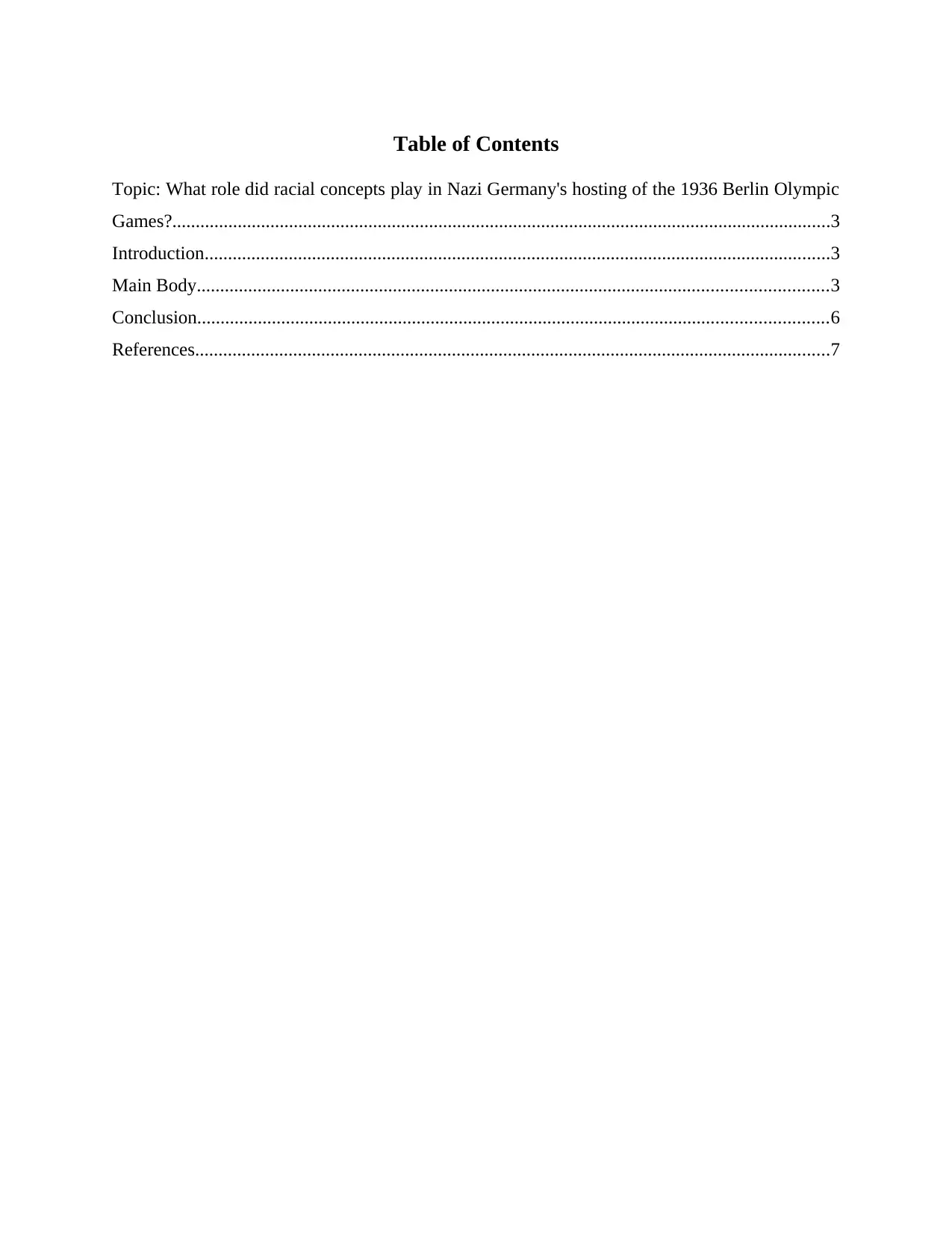
Table of Contents
Topic: What role did racial concepts play in Nazi Germany's hosting of the 1936 Berlin Olympic
Games?.............................................................................................................................................3
Introduction......................................................................................................................................3
Main Body.......................................................................................................................................3
Conclusion.......................................................................................................................................6
References........................................................................................................................................7
Topic: What role did racial concepts play in Nazi Germany's hosting of the 1936 Berlin Olympic
Games?.............................................................................................................................................3
Introduction......................................................................................................................................3
Main Body.......................................................................................................................................3
Conclusion.......................................................................................................................................6
References........................................................................................................................................7
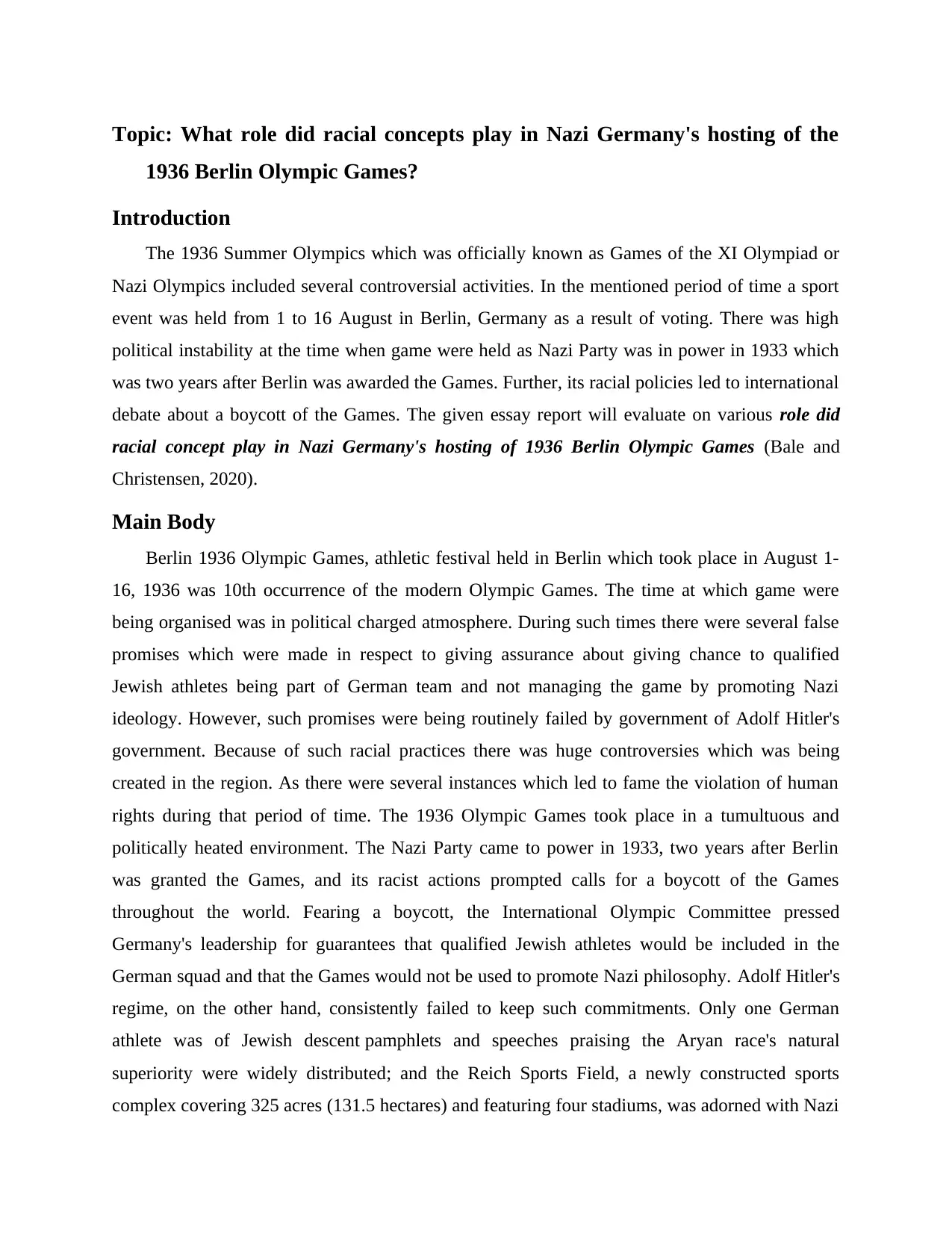
Topic: What role did racial concepts play in Nazi Germany's hosting of the
1936 Berlin Olympic Games?
Introduction
The 1936 Summer Olympics which was officially known as Games of the XI Olympiad or
Nazi Olympics included several controversial activities. In the mentioned period of time a sport
event was held from 1 to 16 August in Berlin, Germany as a result of voting. There was high
political instability at the time when game were held as Nazi Party was in power in 1933 which
was two years after Berlin was awarded the Games. Further, its racial policies led to international
debate about a boycott of the Games. The given essay report will evaluate on various role did
racial concept play in Nazi Germany's hosting of 1936 Berlin Olympic Games (Bale and
Christensen, 2020).
Main Body
Berlin 1936 Olympic Games, athletic festival held in Berlin which took place in August 1-
16, 1936 was 10th occurrence of the modern Olympic Games. The time at which game were
being organised was in political charged atmosphere. During such times there were several false
promises which were made in respect to giving assurance about giving chance to qualified
Jewish athletes being part of German team and not managing the game by promoting Nazi
ideology. However, such promises were being routinely failed by government of Adolf Hitler's
government. Because of such racial practices there was huge controversies which was being
created in the region. As there were several instances which led to fame the violation of human
rights during that period of time. The 1936 Olympic Games took place in a tumultuous and
politically heated environment. The Nazi Party came to power in 1933, two years after Berlin
was granted the Games, and its racist actions prompted calls for a boycott of the Games
throughout the world. Fearing a boycott, the International Olympic Committee pressed
Germany's leadership for guarantees that qualified Jewish athletes would be included in the
German squad and that the Games would not be used to promote Nazi philosophy. Adolf Hitler's
regime, on the other hand, consistently failed to keep such commitments. Only one German
athlete was of Jewish descent pamphlets and speeches praising the Aryan race's natural
superiority were widely distributed; and the Reich Sports Field, a newly constructed sports
complex covering 325 acres (131.5 hectares) and featuring four stadiums, was adorned with Nazi
1936 Berlin Olympic Games?
Introduction
The 1936 Summer Olympics which was officially known as Games of the XI Olympiad or
Nazi Olympics included several controversial activities. In the mentioned period of time a sport
event was held from 1 to 16 August in Berlin, Germany as a result of voting. There was high
political instability at the time when game were held as Nazi Party was in power in 1933 which
was two years after Berlin was awarded the Games. Further, its racial policies led to international
debate about a boycott of the Games. The given essay report will evaluate on various role did
racial concept play in Nazi Germany's hosting of 1936 Berlin Olympic Games (Bale and
Christensen, 2020).
Main Body
Berlin 1936 Olympic Games, athletic festival held in Berlin which took place in August 1-
16, 1936 was 10th occurrence of the modern Olympic Games. The time at which game were
being organised was in political charged atmosphere. During such times there were several false
promises which were made in respect to giving assurance about giving chance to qualified
Jewish athletes being part of German team and not managing the game by promoting Nazi
ideology. However, such promises were being routinely failed by government of Adolf Hitler's
government. Because of such racial practices there was huge controversies which was being
created in the region. As there were several instances which led to fame the violation of human
rights during that period of time. The 1936 Olympic Games took place in a tumultuous and
politically heated environment. The Nazi Party came to power in 1933, two years after Berlin
was granted the Games, and its racist actions prompted calls for a boycott of the Games
throughout the world. Fearing a boycott, the International Olympic Committee pressed
Germany's leadership for guarantees that qualified Jewish athletes would be included in the
German squad and that the Games would not be used to promote Nazi philosophy. Adolf Hitler's
regime, on the other hand, consistently failed to keep such commitments. Only one German
athlete was of Jewish descent pamphlets and speeches praising the Aryan race's natural
superiority were widely distributed; and the Reich Sports Field, a newly constructed sports
complex covering 325 acres (131.5 hectares) and featuring four stadiums, was adorned with Nazi
⊘ This is a preview!⊘
Do you want full access?
Subscribe today to unlock all pages.

Trusted by 1+ million students worldwide
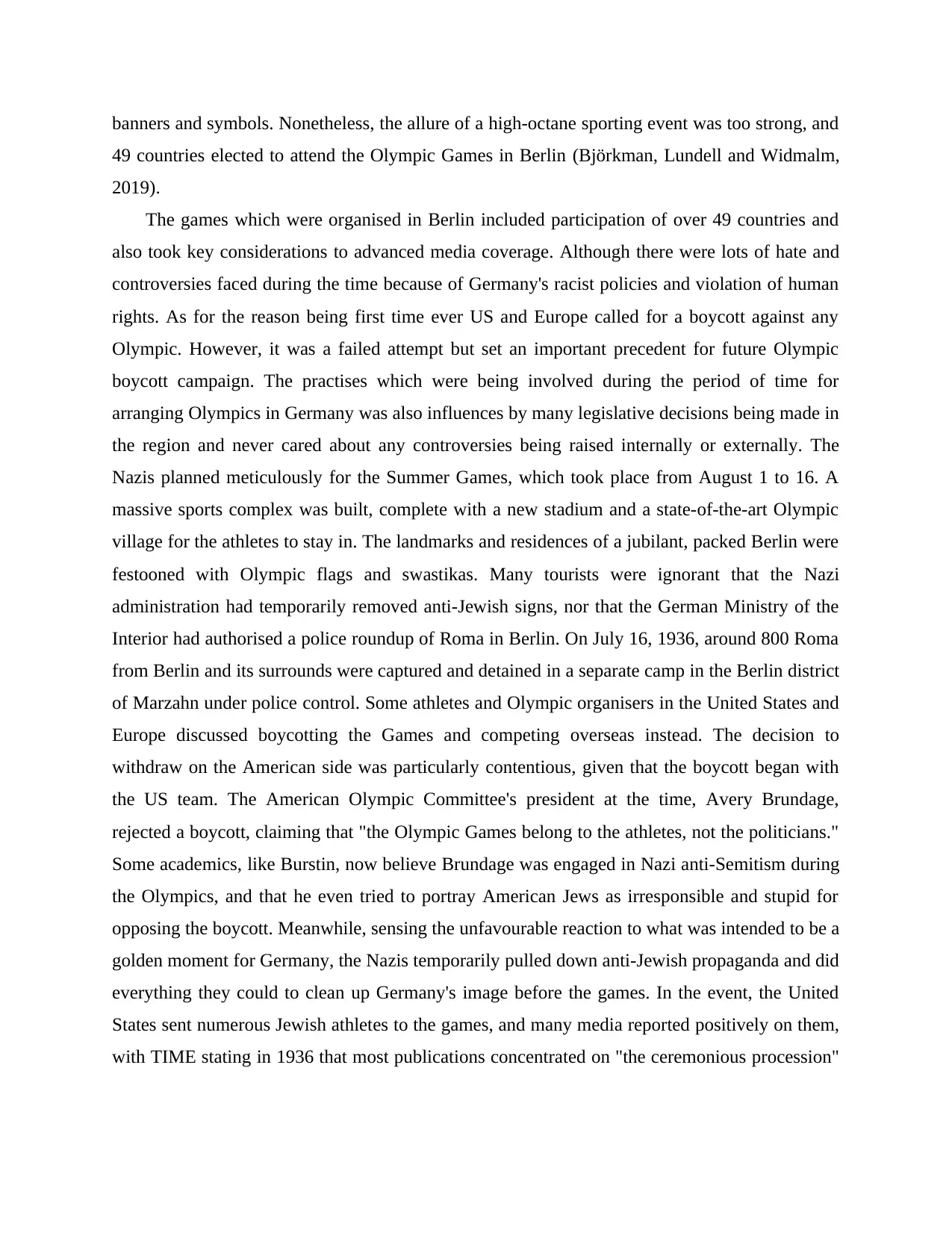
banners and symbols. Nonetheless, the allure of a high-octane sporting event was too strong, and
49 countries elected to attend the Olympic Games in Berlin (Björkman, Lundell and Widmalm,
2019).
The games which were organised in Berlin included participation of over 49 countries and
also took key considerations to advanced media coverage. Although there were lots of hate and
controversies faced during the time because of Germany's racist policies and violation of human
rights. As for the reason being first time ever US and Europe called for a boycott against any
Olympic. However, it was a failed attempt but set an important precedent for future Olympic
boycott campaign. The practises which were being involved during the period of time for
arranging Olympics in Germany was also influences by many legislative decisions being made in
the region and never cared about any controversies being raised internally or externally. The
Nazis planned meticulously for the Summer Games, which took place from August 1 to 16. A
massive sports complex was built, complete with a new stadium and a state-of-the-art Olympic
village for the athletes to stay in. The landmarks and residences of a jubilant, packed Berlin were
festooned with Olympic flags and swastikas. Many tourists were ignorant that the Nazi
administration had temporarily removed anti-Jewish signs, nor that the German Ministry of the
Interior had authorised a police roundup of Roma in Berlin. On July 16, 1936, around 800 Roma
from Berlin and its surrounds were captured and detained in a separate camp in the Berlin district
of Marzahn under police control. Some athletes and Olympic organisers in the United States and
Europe discussed boycotting the Games and competing overseas instead. The decision to
withdraw on the American side was particularly contentious, given that the boycott began with
the US team. The American Olympic Committee's president at the time, Avery Brundage,
rejected a boycott, claiming that "the Olympic Games belong to the athletes, not the politicians."
Some academics, like Burstin, now believe Brundage was engaged in Nazi anti-Semitism during
the Olympics, and that he even tried to portray American Jews as irresponsible and stupid for
opposing the boycott. Meanwhile, sensing the unfavourable reaction to what was intended to be a
golden moment for Germany, the Nazis temporarily pulled down anti-Jewish propaganda and did
everything they could to clean up Germany's image before the games. In the event, the United
States sent numerous Jewish athletes to the games, and many media reported positively on them,
with TIME stating in 1936 that most publications concentrated on "the ceremonious procession"
49 countries elected to attend the Olympic Games in Berlin (Björkman, Lundell and Widmalm,
2019).
The games which were organised in Berlin included participation of over 49 countries and
also took key considerations to advanced media coverage. Although there were lots of hate and
controversies faced during the time because of Germany's racist policies and violation of human
rights. As for the reason being first time ever US and Europe called for a boycott against any
Olympic. However, it was a failed attempt but set an important precedent for future Olympic
boycott campaign. The practises which were being involved during the period of time for
arranging Olympics in Germany was also influences by many legislative decisions being made in
the region and never cared about any controversies being raised internally or externally. The
Nazis planned meticulously for the Summer Games, which took place from August 1 to 16. A
massive sports complex was built, complete with a new stadium and a state-of-the-art Olympic
village for the athletes to stay in. The landmarks and residences of a jubilant, packed Berlin were
festooned with Olympic flags and swastikas. Many tourists were ignorant that the Nazi
administration had temporarily removed anti-Jewish signs, nor that the German Ministry of the
Interior had authorised a police roundup of Roma in Berlin. On July 16, 1936, around 800 Roma
from Berlin and its surrounds were captured and detained in a separate camp in the Berlin district
of Marzahn under police control. Some athletes and Olympic organisers in the United States and
Europe discussed boycotting the Games and competing overseas instead. The decision to
withdraw on the American side was particularly contentious, given that the boycott began with
the US team. The American Olympic Committee's president at the time, Avery Brundage,
rejected a boycott, claiming that "the Olympic Games belong to the athletes, not the politicians."
Some academics, like Burstin, now believe Brundage was engaged in Nazi anti-Semitism during
the Olympics, and that he even tried to portray American Jews as irresponsible and stupid for
opposing the boycott. Meanwhile, sensing the unfavourable reaction to what was intended to be a
golden moment for Germany, the Nazis temporarily pulled down anti-Jewish propaganda and did
everything they could to clean up Germany's image before the games. In the event, the United
States sent numerous Jewish athletes to the games, and many media reported positively on them,
with TIME stating in 1936 that most publications concentrated on "the ceremonious procession"
Paraphrase This Document
Need a fresh take? Get an instant paraphrase of this document with our AI Paraphraser
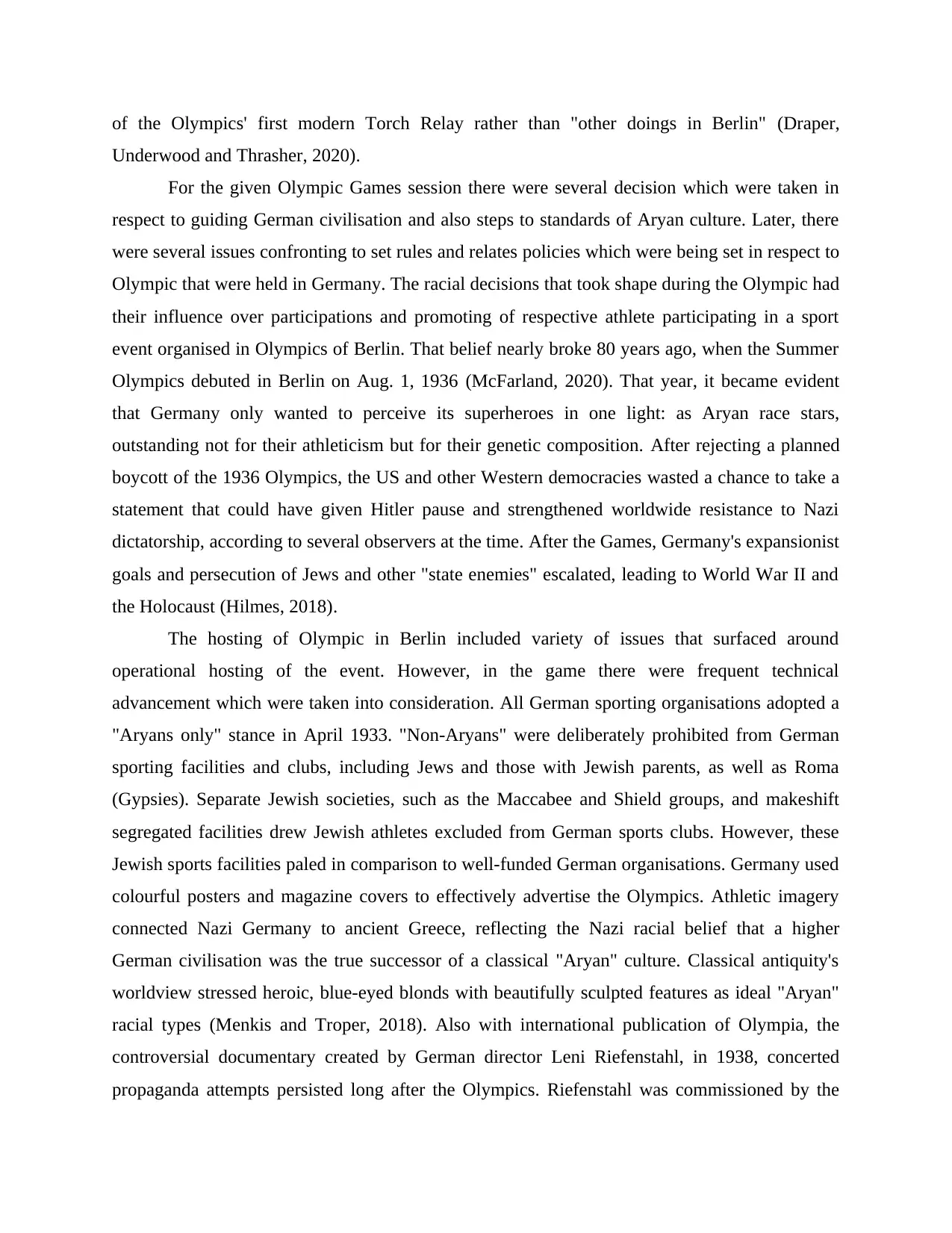
of the Olympics' first modern Torch Relay rather than "other doings in Berlin" (Draper,
Underwood and Thrasher, 2020).
For the given Olympic Games session there were several decision which were taken in
respect to guiding German civilisation and also steps to standards of Aryan culture. Later, there
were several issues confronting to set rules and relates policies which were being set in respect to
Olympic that were held in Germany. The racial decisions that took shape during the Olympic had
their influence over participations and promoting of respective athlete participating in a sport
event organised in Olympics of Berlin. That belief nearly broke 80 years ago, when the Summer
Olympics debuted in Berlin on Aug. 1, 1936 (McFarland, 2020). That year, it became evident
that Germany only wanted to perceive its superheroes in one light: as Aryan race stars,
outstanding not for their athleticism but for their genetic composition. After rejecting a planned
boycott of the 1936 Olympics, the US and other Western democracies wasted a chance to take a
statement that could have given Hitler pause and strengthened worldwide resistance to Nazi
dictatorship, according to several observers at the time. After the Games, Germany's expansionist
goals and persecution of Jews and other "state enemies" escalated, leading to World War II and
the Holocaust (Hilmes, 2018).
The hosting of Olympic in Berlin included variety of issues that surfaced around
operational hosting of the event. However, in the game there were frequent technical
advancement which were taken into consideration. All German sporting organisations adopted a
"Aryans only" stance in April 1933. "Non-Aryans" were deliberately prohibited from German
sporting facilities and clubs, including Jews and those with Jewish parents, as well as Roma
(Gypsies). Separate Jewish societies, such as the Maccabee and Shield groups, and makeshift
segregated facilities drew Jewish athletes excluded from German sports clubs. However, these
Jewish sports facilities paled in comparison to well-funded German organisations. Germany used
colourful posters and magazine covers to effectively advertise the Olympics. Athletic imagery
connected Nazi Germany to ancient Greece, reflecting the Nazi racial belief that a higher
German civilisation was the true successor of a classical "Aryan" culture. Classical antiquity's
worldview stressed heroic, blue-eyed blonds with beautifully sculpted features as ideal "Aryan"
racial types (Menkis and Troper, 2018). Also with international publication of Olympia, the
controversial documentary created by German director Leni Riefenstahl, in 1938, concerted
propaganda attempts persisted long after the Olympics. Riefenstahl was commissioned by the
Underwood and Thrasher, 2020).
For the given Olympic Games session there were several decision which were taken in
respect to guiding German civilisation and also steps to standards of Aryan culture. Later, there
were several issues confronting to set rules and relates policies which were being set in respect to
Olympic that were held in Germany. The racial decisions that took shape during the Olympic had
their influence over participations and promoting of respective athlete participating in a sport
event organised in Olympics of Berlin. That belief nearly broke 80 years ago, when the Summer
Olympics debuted in Berlin on Aug. 1, 1936 (McFarland, 2020). That year, it became evident
that Germany only wanted to perceive its superheroes in one light: as Aryan race stars,
outstanding not for their athleticism but for their genetic composition. After rejecting a planned
boycott of the 1936 Olympics, the US and other Western democracies wasted a chance to take a
statement that could have given Hitler pause and strengthened worldwide resistance to Nazi
dictatorship, according to several observers at the time. After the Games, Germany's expansionist
goals and persecution of Jews and other "state enemies" escalated, leading to World War II and
the Holocaust (Hilmes, 2018).
The hosting of Olympic in Berlin included variety of issues that surfaced around
operational hosting of the event. However, in the game there were frequent technical
advancement which were taken into consideration. All German sporting organisations adopted a
"Aryans only" stance in April 1933. "Non-Aryans" were deliberately prohibited from German
sporting facilities and clubs, including Jews and those with Jewish parents, as well as Roma
(Gypsies). Separate Jewish societies, such as the Maccabee and Shield groups, and makeshift
segregated facilities drew Jewish athletes excluded from German sports clubs. However, these
Jewish sports facilities paled in comparison to well-funded German organisations. Germany used
colourful posters and magazine covers to effectively advertise the Olympics. Athletic imagery
connected Nazi Germany to ancient Greece, reflecting the Nazi racial belief that a higher
German civilisation was the true successor of a classical "Aryan" culture. Classical antiquity's
worldview stressed heroic, blue-eyed blonds with beautifully sculpted features as ideal "Aryan"
racial types (Menkis and Troper, 2018). Also with international publication of Olympia, the
controversial documentary created by German director Leni Riefenstahl, in 1938, concerted
propaganda attempts persisted long after the Olympics. Riefenstahl was commissioned by the
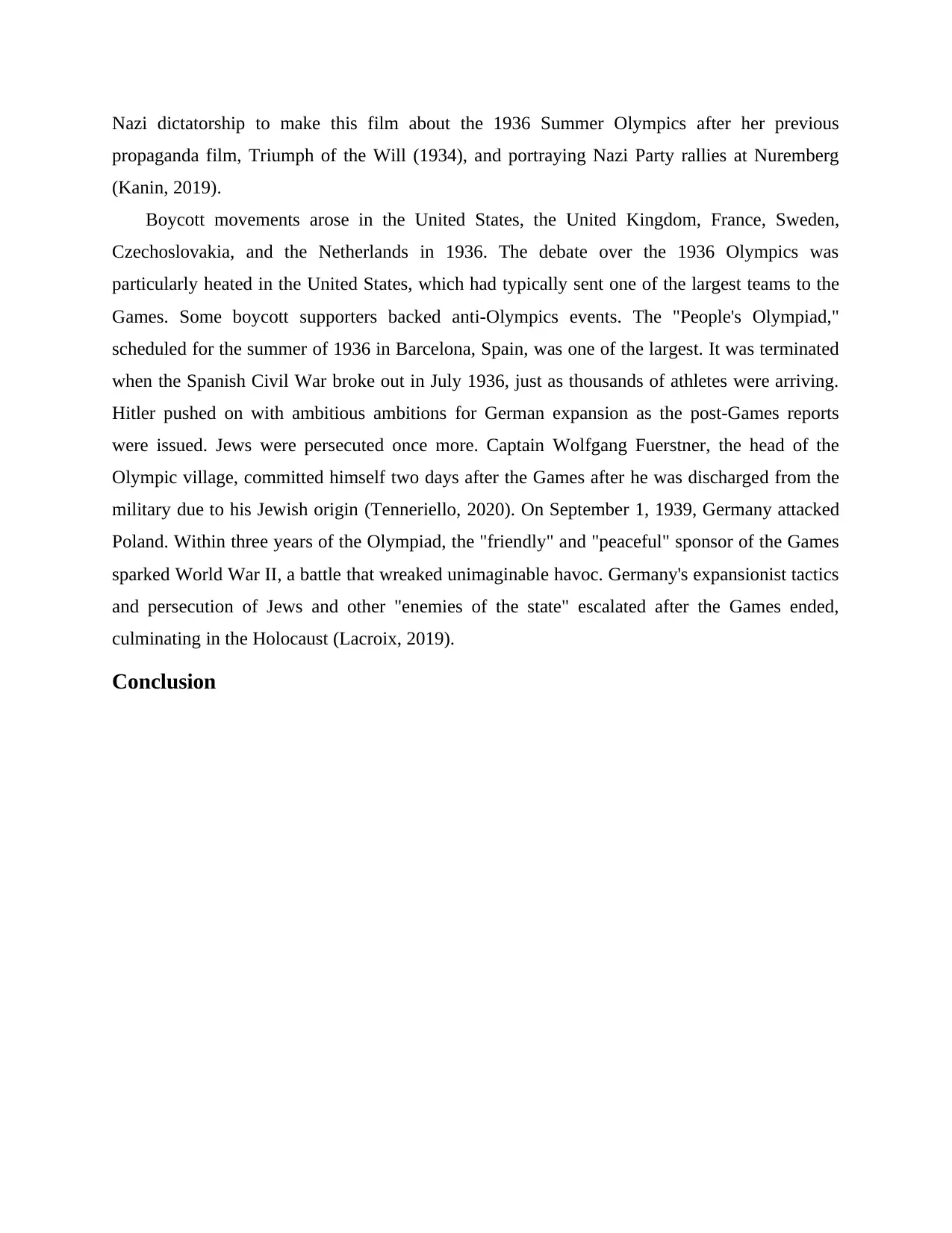
Nazi dictatorship to make this film about the 1936 Summer Olympics after her previous
propaganda film, Triumph of the Will (1934), and portraying Nazi Party rallies at Nuremberg
(Kanin, 2019).
Boycott movements arose in the United States, the United Kingdom, France, Sweden,
Czechoslovakia, and the Netherlands in 1936. The debate over the 1936 Olympics was
particularly heated in the United States, which had typically sent one of the largest teams to the
Games. Some boycott supporters backed anti-Olympics events. The "People's Olympiad,"
scheduled for the summer of 1936 in Barcelona, Spain, was one of the largest. It was terminated
when the Spanish Civil War broke out in July 1936, just as thousands of athletes were arriving.
Hitler pushed on with ambitious ambitions for German expansion as the post-Games reports
were issued. Jews were persecuted once more. Captain Wolfgang Fuerstner, the head of the
Olympic village, committed himself two days after the Games after he was discharged from the
military due to his Jewish origin (Tenneriello, 2020). On September 1, 1939, Germany attacked
Poland. Within three years of the Olympiad, the "friendly" and "peaceful" sponsor of the Games
sparked World War II, a battle that wreaked unimaginable havoc. Germany's expansionist tactics
and persecution of Jews and other "enemies of the state" escalated after the Games ended,
culminating in the Holocaust (Lacroix, 2019).
Conclusion
propaganda film, Triumph of the Will (1934), and portraying Nazi Party rallies at Nuremberg
(Kanin, 2019).
Boycott movements arose in the United States, the United Kingdom, France, Sweden,
Czechoslovakia, and the Netherlands in 1936. The debate over the 1936 Olympics was
particularly heated in the United States, which had typically sent one of the largest teams to the
Games. Some boycott supporters backed anti-Olympics events. The "People's Olympiad,"
scheduled for the summer of 1936 in Barcelona, Spain, was one of the largest. It was terminated
when the Spanish Civil War broke out in July 1936, just as thousands of athletes were arriving.
Hitler pushed on with ambitious ambitions for German expansion as the post-Games reports
were issued. Jews were persecuted once more. Captain Wolfgang Fuerstner, the head of the
Olympic village, committed himself two days after the Games after he was discharged from the
military due to his Jewish origin (Tenneriello, 2020). On September 1, 1939, Germany attacked
Poland. Within three years of the Olympiad, the "friendly" and "peaceful" sponsor of the Games
sparked World War II, a battle that wreaked unimaginable havoc. Germany's expansionist tactics
and persecution of Jews and other "enemies of the state" escalated after the Games ended,
culminating in the Holocaust (Lacroix, 2019).
Conclusion
⊘ This is a preview!⊘
Do you want full access?
Subscribe today to unlock all pages.

Trusted by 1+ million students worldwide
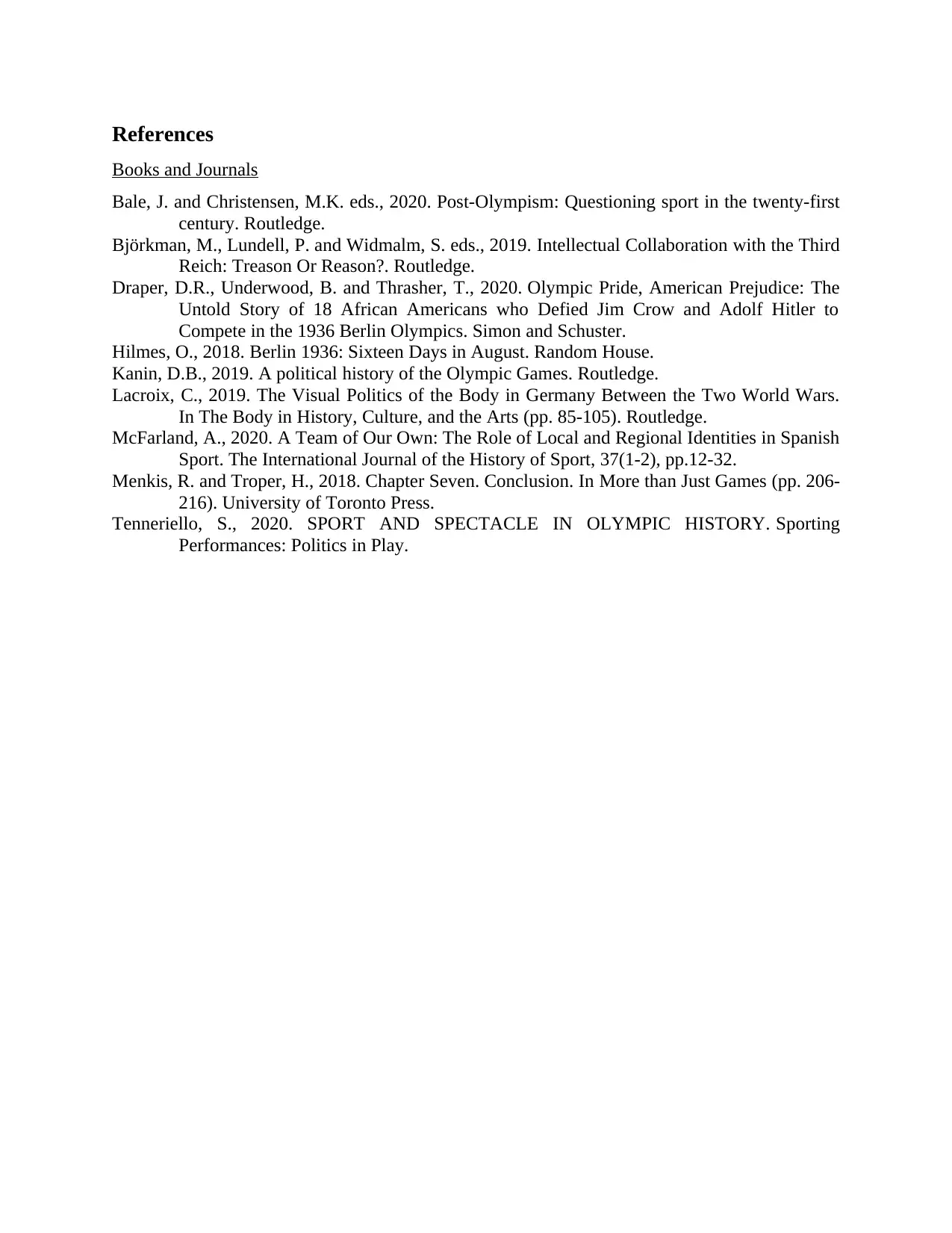
References
Books and Journals
Bale, J. and Christensen, M.K. eds., 2020. Post-Olympism: Questioning sport in the twenty-first
century. Routledge.
Björkman, M., Lundell, P. and Widmalm, S. eds., 2019. Intellectual Collaboration with the Third
Reich: Treason Or Reason?. Routledge.
Draper, D.R., Underwood, B. and Thrasher, T., 2020. Olympic Pride, American Prejudice: The
Untold Story of 18 African Americans who Defied Jim Crow and Adolf Hitler to
Compete in the 1936 Berlin Olympics. Simon and Schuster.
Hilmes, O., 2018. Berlin 1936: Sixteen Days in August. Random House.
Kanin, D.B., 2019. A political history of the Olympic Games. Routledge.
Lacroix, C., 2019. The Visual Politics of the Body in Germany Between the Two World Wars.
In The Body in History, Culture, and the Arts (pp. 85-105). Routledge.
McFarland, A., 2020. A Team of Our Own: The Role of Local and Regional Identities in Spanish
Sport. The International Journal of the History of Sport, 37(1-2), pp.12-32.
Menkis, R. and Troper, H., 2018. Chapter Seven. Conclusion. In More than Just Games (pp. 206-
216). University of Toronto Press.
Tenneriello, S., 2020. SPORT AND SPECTACLE IN OLYMPIC HISTORY. Sporting
Performances: Politics in Play.
Books and Journals
Bale, J. and Christensen, M.K. eds., 2020. Post-Olympism: Questioning sport in the twenty-first
century. Routledge.
Björkman, M., Lundell, P. and Widmalm, S. eds., 2019. Intellectual Collaboration with the Third
Reich: Treason Or Reason?. Routledge.
Draper, D.R., Underwood, B. and Thrasher, T., 2020. Olympic Pride, American Prejudice: The
Untold Story of 18 African Americans who Defied Jim Crow and Adolf Hitler to
Compete in the 1936 Berlin Olympics. Simon and Schuster.
Hilmes, O., 2018. Berlin 1936: Sixteen Days in August. Random House.
Kanin, D.B., 2019. A political history of the Olympic Games. Routledge.
Lacroix, C., 2019. The Visual Politics of the Body in Germany Between the Two World Wars.
In The Body in History, Culture, and the Arts (pp. 85-105). Routledge.
McFarland, A., 2020. A Team of Our Own: The Role of Local and Regional Identities in Spanish
Sport. The International Journal of the History of Sport, 37(1-2), pp.12-32.
Menkis, R. and Troper, H., 2018. Chapter Seven. Conclusion. In More than Just Games (pp. 206-
216). University of Toronto Press.
Tenneriello, S., 2020. SPORT AND SPECTACLE IN OLYMPIC HISTORY. Sporting
Performances: Politics in Play.
1 out of 7
Your All-in-One AI-Powered Toolkit for Academic Success.
+13062052269
info@desklib.com
Available 24*7 on WhatsApp / Email
![[object Object]](/_next/static/media/star-bottom.7253800d.svg)
Unlock your academic potential
Copyright © 2020–2026 A2Z Services. All Rights Reserved. Developed and managed by ZUCOL.
